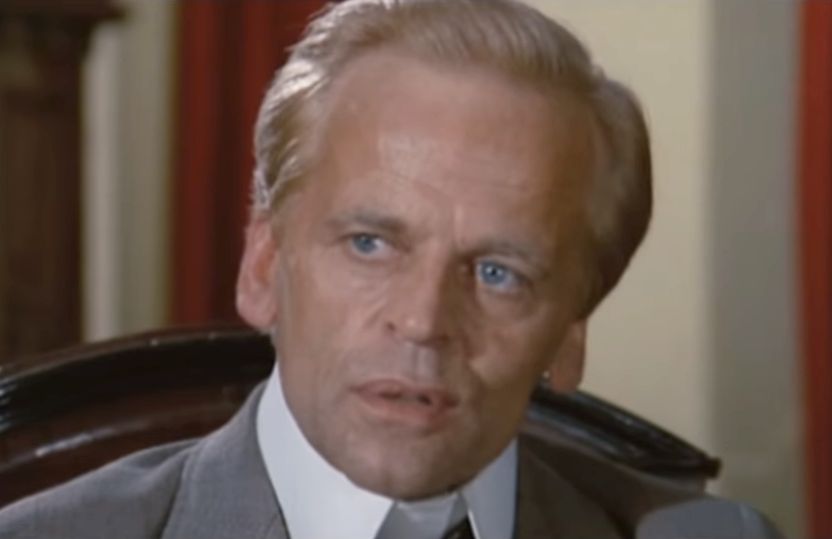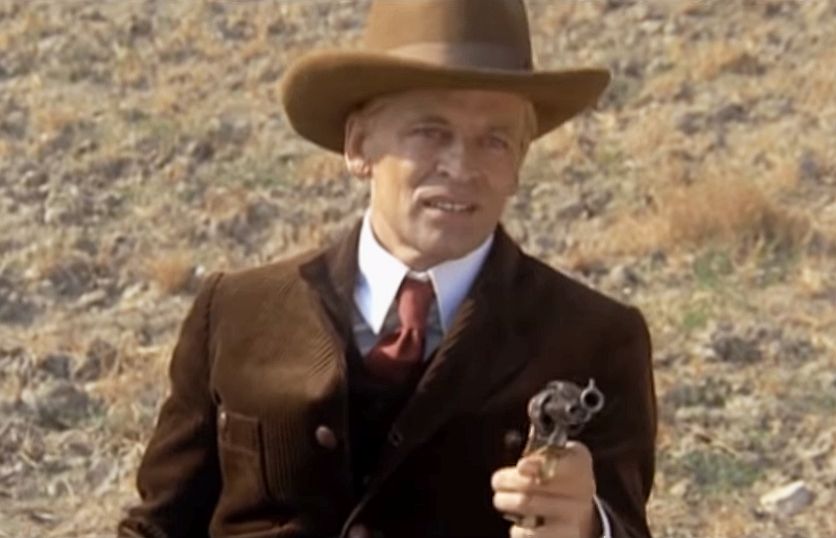Dir: Bitto Albertini
Star: Cheen Lie, Tommy Polgár, Klaus Kinski, Karin Field
a.k.a. Che botte ragazzi!
It took the makers of My Name is Shanghai Joe considerably less time to make a sequel after the original, than it took me to watch it. Turns out I covered the original more than six years ago, which probably explains why I don’t remember much about it. Re-reading my review, seems I enjoyed it, at least on an entertainment level. The same can not be said to the same extent for the sequel, which is trying considerably harder on the comedy level than either the kung-fu or Western ones. And not with a great deal of success, either.
It can fairly be said that this is a “Return”, in only the loosest possible sense. There’s a different director, Albertini (best known for the Black Emanuelle films, starring Laura Gemser) taking over from Mario Caiano. There’s a new star, Cheen replacing the similarly-named – not coincidentally, I’m sure – Chen Lee. Writer Carlo Alberto Alfieri does return: he’d go on to be an executive producer on both Paganini and Vampire in Venice. Klaus is about the only significant actor to be in both movies. But even he plays a completely different character – out of necessity, since ‘Scalper Jack’ did not survive his encounter with Joe in the previous film. At least there’s a good helping of Kinski here, unlike last time, when it was little more than an extended cameo.
Proceedings here open with general charlatan, Bill Cannon (Polgár), trying to detect water with a divining rod for a Mexican village. He actually finds oil instead, which brings the place to the attention of Pat Barnes (Kinski). Barnes is a land shark of the most vicious kind, who had used threats and flat-out violence to acquire a large portfolio of territory and businesses, in and around the city of Glenwood. However, it’s not all plain sailing. When his men try to muscle in on the Mexicans, Shanghai Joe (Cheen) sends them off, in no uncertain terms. Worse still, after Barnes’s pet magistrate dies suddenly, a replacement, Judge Finney, is on the way to town with his pretty daughter, Carol (Field). And there’s no guarantee he’ll be as malleable as his predecessor.
Meanwhile, Bill has returned to his day-job as a snake-oil salesman. On the road, he helps an injured Mexican bandit, Pedro Gomez, who had been allied with Barnes until being betrayed by him. Before dying, Gomez proves a wealth of information about Barnes and his operation. He bequeaths his corpse to Bill, so he can collect the $1,000 bounty. But doing so puts Bill on Barnes’s radar as a possible threat, and has to be disposed of. Fortunately, Joe is in the right place at the right time to stop the fake robbers from dangling Bill. This is not the first time Joe has run interference against Barnes: he had previously stopped an assassination attempt on Judge Finney, and won big on craps at the saloon. So he joins Bill on the businessman’s hit-list.

Finney is beginning to ask some uncomfortable questions about Barnes’s business practices. When his lawyer, Jonathan Smith, proves a potential weak-spot following an interview by the judge, Barnes decides to kill two birds (somewhat literally) with one stone: have Smith murdered and frame Joe for the crime. Bill repays his debt of life by alerting Judge Finney, just in time to save Joe from a lynching. And it turns out Smith had already given a full confession, incriminating Barnes. Bill helps Joe escape jail, and when the sheriff tries to arrest Barnes on Finney’s warrant, he’s shot for his pains, though this does make him realize Joe’s innocent.
Barnes abducts Carol and tries to make a stand at his hacienda, with her as a hostage. When forced to flee from there, Joe gives pursuit, but discovers that no matter how good your martial arts, a bullet will always be quicker. Fortunately, Bill is there to lend support with a weapon of his own, and Barnes gets gunned down just as he’s about to administer the coup de grace to Joe. This feature a surprisingly good stunt fall by Kinski, head first over a boulder onto what looks like a thoroughly unyielding surface. There doesn’t appear to be any opportunity for a stunt double either, since the shot begins with a medium close-up of Klaus.
To be honest, I didn’t think much of this at the time. But it got a second go-around during this write-up, and it seemed to play a bit better that time. Oh, there are still substantial flaws, such as the abominably jaunty theme-song, which appears to break out every time Joe goes in battle. And that happens a lot… It also doesn’t help that the martial arts on view here are feeble, even by the low standards of Italian comedy Westerns. The IMDb says this was the only role for Cheen, and it’s easy to understand why (though that may also have been a pseudonym adopted purely for this production*), since he possesses no screen presence at all. Meanwhile, Polgár is channeling Bud Spencer so hard, my teeth began to hurt, and the final revelation, that Joe is a federal agent… “I didn’t see that coming” is the kindest comment I can make.
The big positive is the sharply-increased quantity of Klaus – the Kinski Kuotient, if you will. As the main antagonist, he seems to pop in about every 10 minutes. Things inevitably liven up when he does, though the love triangle between Barnes, Carol and a previous victim of Barnes’s shenanigans, Manuel Garcia, doesn’t go anywhere. But it’s always fun to see him berating and slapping around his hapless and incompetent minions after they have, once again, failed in their allotted tasks. While unlikely to make it onto anyone’s list of ten greatest Kinski performances, this did help stop the film from becoming the painful dud it occasionally resembles.

* According to the Spaghetti Western Database, this is indeed a pseudonym, and was the final film of Ernest Van-Mohr.
